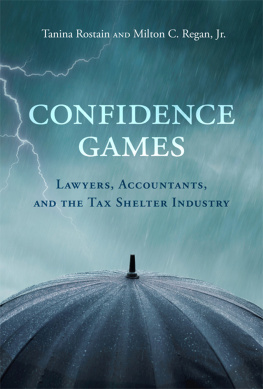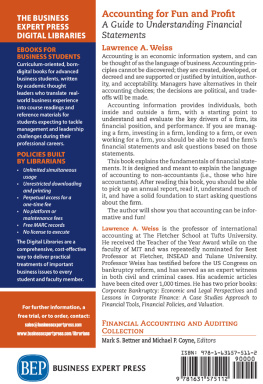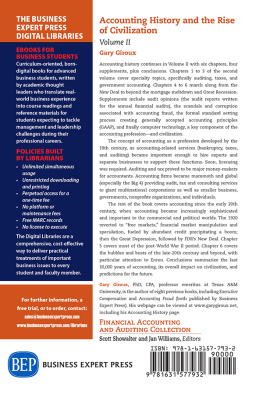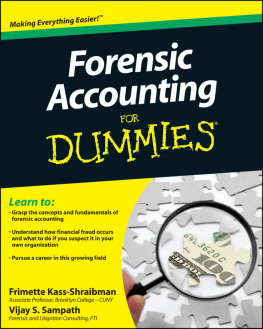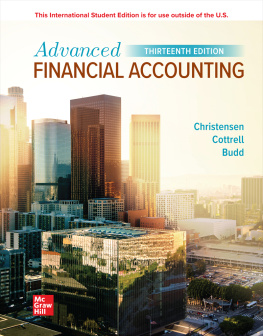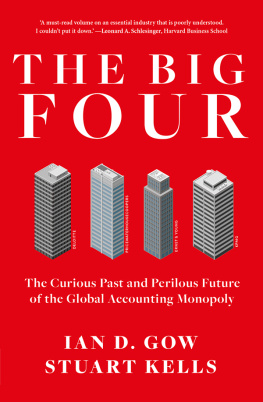Confidence Games
Confidence Games
Lawyers, Accountants, and the Tax Shelter Industry
Tanina Rostain and Milton C. Regan, Jr.
The MIT Press
Cambridge, Massachusetts
London, England
2014 Massachusetts Institute of Technology
All rights reserved. No part of this book may be reproduced in any form by any electronic or mechanical means (including photocopying, recording, or information storage and retrieval) without permission in writing from the publisher.
Library of Congress Cataloging-in-Publication Data
Rostain, Tanina.
Confidence games : lawyers, accountants, and the tax shelter industry / Tanina Rostain and Milton C. Regan, Jr.
p. cm.
Includes bibliographical references and index.
ISBN 978-0-262-02713-7 (hardcover : alk. paper)
ISBN 978-0-262-32317-8 (retail e-book)
1. Tax sheltersUnited StatesHistory. 2. Tax sheltersLaw and legislationUnitedStatesHistory. 3. CorporationsTaxationUnited StatesHistory. 4. TaxationMoral and ethical aspectsUnited StatesHistory. I. Regan, Milton C. II. Title.
HJ4653.T38R67 2014
336.206dc23
2013034776
To the determined journalists who dug deeply to bring this story to light.
Acknowledgments and Note on Sources
Many people helped us to uncover the details of the story we tell here. Among them are the business reporters to whom this book is dedicated. Were it not for their dogged insistence on ferreting out the facts and their willingness to untangle the complexities of tax law and its application to sophisticated financial transactions, the widespread participation of major accounting firms and corporate law firms in the shelter industry would likely not have come to light. We learned much from the many journalists who wrote on this subject. We are especially grateful to Paul Braverman, Lynnley Browning, Cassell Bryan-Low, Cheryl Hall, Tom Herman, John McKinnon, Janet Novack, Rick Rothacker, and Lee Sheppard for giving generously of their time to speak with us.
Publications by Tax Analysts, a nonprofit organization devoted to providing news and analysis of tax issues, were invaluable. Tax Notes Today (cited in the notes as TNT) was an extraordinary source of detailed information about events relating to tax shelters and tax policy. The organization and its publications are a unique national resource on the vital topic of the United States tax system.
A number of lawyers who brought civil cases against law firms, accounting firms, and financial institutions involved in the shelter industry agreed to be interviewed and discuss their experiences with us. These lawyers shared a talent for recognizing that beneath the technical complexities, these organizations had perpetrated fraud not only on the government but also on their own clients. In almost all cases, the litigation was subject to a court order that prevented lawyers representing the plaintiffs from sharing documents and other discovery materials with us. The lawyers with whom we spoke did their utmost to educate us about the facts that emerged in their cases without violating their professional obligations. We would like to thank Ralph Canada, David Deary, Blair Fensterstock, Campbell Killefer, Gary Mauney, Michael Phillips, Edmundo Ramirez, Stefan Tucker, and Damon Wright for sharing their insights with us. We are also grateful to members of the U.S. Department of Justices Tax Division who were involved in civil and criminal cases involving tax shelters for their willingness to discuss matters of public record with us.
Mike Hamersley, a former lawyer at KPMG, braved retaliation from the firm to report the wrongdoing he witnessed to governmental officials and testify about it in Congress. Mike provided us with a vivid account of his time at KPMG. He also has the rare capacity to explain clearly and in nontechnical terms the transactions about which we have written. We are grateful for his substantial assistance.
During our research for this book, we interviewed numerous firsthand observers of and participants in the events, including former government officials and partners at accounting firms and law firms. Consistent with common practice in writing on such a sensitive subject, we agreed to keep the identity of our informants confidential. In cases in which the account of an event is traceable to an identifiable source, we have obtained permission to describe the event. To keep our endnotes to a minimum, we do not cite these sources.
By the time the events described in these pages had reached their denouement, hundreds of thousands of pages of documents had become part of the public record. In writing this book, we reviewed transcripts of congressional hearings and related exhibits; documents related to government enforcement proceedings; criminal indictments and informations; settlement agreements; deferred prosecution and nonprosecution agreements; and civil and criminal trial pleadings, transcripts, and exhibits, among other materials.
Despite the wealth of documents that are now part of the public record, there are pieces of this story that we suspect we were unable to uncover. As we have noted, in almost all cases brought by clients against their former firms, the plaintiffs lawyers were prevented by court orders from disclosing documents and discovery materials they had obtained. These orders were sought by the organizational defendants, who insisted that the shelters in question were legitimate financial transactions involving proprietary information. We believe that in most cases these orders are no longer justifiedif they ever wereand that these materials should be available under the First Amendment right of access to public records. In the interest of completing this book, we decided not to challenge these orders, which would have required litigation in state courts all over the country. We also filed a number of Freedom of Information Act requests, which resulted in the acquisition of a few but not all of the documents we believed we were entitled to receive. Here too we decided not to challenge the governments responses to our requests.
Over the course of this project, numerous students at New York Law School, Harvard Law School, and Georgetown Law Center provided superb research assistance. When Tanina Rostain first started investigating the role of accounting firms in the tax shelter industry, Christine Harrington, NYLS 03, and Ilir Mujalovic, NYLS 03, obtained useful materials, wrote detailed memos, and served as helpful sounding boards. Billy Magnuson, Harvard Law School 10, offered insightful suggestions about the substance of the project and traveled far and wide to retrieve documents filed in state court proceedings. Toward the end of the drafting process, Hilary Pugmire, NYLS 12, did an excellent job of coordinating a large number of students recruited to observe ongoing criminal trials. Alice Townes, NYLS 12, kept close track of proceedings and events and wrote many helpful memos, offering frequent astute observations along the way. Zach Hutchinson, GULC 16, was invaluable in researching and helping to put the final touches on the manuscript. We are grateful to these students and many others for the time and effort they devoted to helping us with this project. Anna Selden, the Faculty Manuscripts Editor at Georgetown Law Center, engaged in a careful read of the manuscript and provided us with many useful edits.
From the beginning Roxanne Coady was an enthusiastic supporter of this project. Michael Graetz and Linc Caplan gave us helpful suggestions on our earliest efforts. Susan Silbey reminded us throughout the project to keep our eye on organizational structures and dynamics when we were tempted to see the narrative as a story about individuals. Sally Gordon was always available as a sounding board for Tanina when the problems seemed intractable.
Many tax colleagues reviewed and commented on the manuscript. Dennis Ventry reviewed the full manuscript and provided a wealth of substantive and editorial suggestions. Karen Burke, Dan Davidson, Michael Doran, Grayson McCouch, Alan Kaden, and David Weisbach read portions of the manuscript and gave us helpful comments. Steve Cohen, Albert Lauber, Ron Pearlman, Stafford Smiley, and Ethan Yale gave generously of their time to enlighten us on many aspects of tax shelters and the tax system. Several anonymous readers also reviewed the manuscript for the MIT Press. We are grateful to these colleagues for helping us describe as accurately as we could the complex tax policy and regulatory issues involved and for sharing their recollections of the events. Any errors or omissions are, of course, our responsibility. Nancy Sachs offered the perspective of a nonspecialist who read the entire manuscript with a critical eye and an ear keenly attuned to infelicitous language.
Next page
